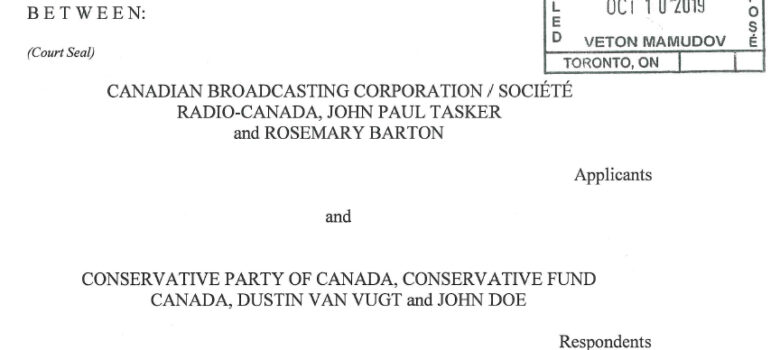As the 2019 federal election winds toward voting day next week, copyright has unexpectedly arrived on the scene. Cultural groups have lamented for weeks that none of the national political parties have discussed copyright, placed it in their platforms, or otherwise committed to reforms. The likely reason – neatly articulated by OpenMedia’s Laura Tribe in this week’s Lawbytes podcast – is that there are no sharp divisions between the parties on copyright that might provide an electoral advantage. Instead, the government conducted an extensive copyright review which led to the Industry Committee’s June 2019 report. That committee, which heard from hundreds of witnesses representing all perspectives, generated a report that received all-party support and provides a roadmap for future reforms (the notable exception being on crown copyright).
Notwithstanding the all-party agreement, cultural groups have been lobbying the political parties to reject the report. For example, the Canada Arts Coalition instead supports the discredited Canadian Heritage committee study, which was designed as supplement to the copyright review. The Writers Union goes even further, arguing that the Department of Canadian Heritage should complete the copyright review. Given that the Copyright Act itself identifies the Minister of Industry as the Minister for the purposes of references in the law, the proposal would represent a dramatic shift in the law that no committee recommended. These recommendations have unsurprisingly garnered no traction throughout the campaign as parties presumably are left to wonder how groups that spent years lobbying in preparation for the copyright review now want it ignored only months after its release.
In fact, the difference between the copyright review and cultural groups demands are placed into context with the emergence of an important copyright issue in the campaign: the CBC copyright infringement lawsuit against the Conservative Party for the use of seven clips in a campaign ad and on Twitter. The Conservative Party has a strong argument that the use is permitted under the law without the need for prior permission. Several of the clips are so short that they are arguably insubstantial and do not even rise to the level of needing to identify a user’s right or copyright exception. For the remaining clips, there is a strong fair dealing argument alongside the possibility of arguing that the non-commercial user generated content exception would be applicable. The case highlights why users’ rights are directly linked to freedom of expression and why copyright exceptions are essential for all Canadians, including students, teachers, journalists, and politicians.
Despite their importance, the Coalition for the Diversity of Cultural Expressions, which counts virtually every major cultural lobby group among its membership, argues:
The number of exceptions in the Copyright Act must be reduced and the remaining exceptions must be compensated.
These are the same exceptions that the Conservative Party relies upon to express themselves in the current campaign. Of course, all political parties use copyright materials in their own materials and could be the target of a similar suit. Further, the call for mandatory compensation shows how these groups misunderstand the very purpose of copyright exceptions. In the case of the CBC, the broadcaster has left little doubt that permission to use the clips is not available at any price. In other words, absent copyright exceptions, the law can be used to stifle free speech.
The copyright review understood the importance of fair dealing and copyright exceptions. In fact, MPs from all parties recommended making them more flexible to anticipate new uses and to safeguard against restrictive lawsuits:
Parliament should make the list of purposes enumerated under section 29 of the Act an illustrative list rather than an exhaustive one. Doing so would increase the flexibility of the Act by allowing a broader range of admissible purposes to emerge from existing ones under the guidance and the supervision of the courts—for example, from criticism to quotation, from parody to pastiche, and from research to informational analysis. Such an amendment could allow new practices to fall under fair dealing, such as “reaction videos” and video game streaming. The Committee emphasizes that the purpose of a dealing is only one of many factors taken into account when determining whether this dealing is indeed fair under section 29 of the Act.
Copyright may not be priority one for the new government, but when reforms are considered, the copyright review report and this recommendation is the obvious place to start.











Pingback: Media News Digest: Election stuff, CHCH’s new late-night vanity show, Mike Boone retires from Habs blogging | Fagstein
Pingback: October 18, 2019 – The Friendly Daily
Pingback: News of the Week; October 23, 2019 – Communications Law at Allard Hall